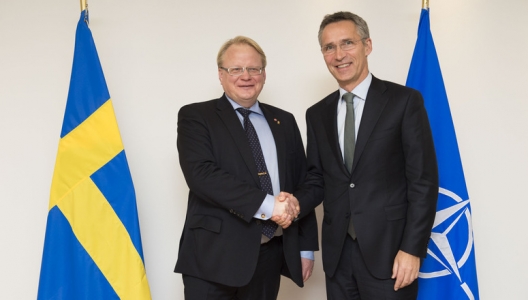 For Sweden, NATO’s recent reinforcements in the Baltic Sea region are of course a welcome development, as they contribute to regional stability. Nevertheless Sweden has a much different security outlook than Denmark. Lacking formal Article 5 protection, Sweden would stand alone in the face a foreign threat—a message that was reinforced by U.S. NATO Ambassador Douglas Lute during a recent visit to Stockholm. Many within the Swedish defense community still like to pretend that allied forces would probably come to the rescue if Sweden came under attack. But the ambiguity of this response is clearly not conducive to either Sweden’s or the region’s security. No amount of solidarity declarations or partnerships with NATO or other Nordic countries can change the fact that NATO is the only game in town when it comes to collective defense….
For Sweden, NATO’s recent reinforcements in the Baltic Sea region are of course a welcome development, as they contribute to regional stability. Nevertheless Sweden has a much different security outlook than Denmark. Lacking formal Article 5 protection, Sweden would stand alone in the face a foreign threat—a message that was reinforced by U.S. NATO Ambassador Douglas Lute during a recent visit to Stockholm. Many within the Swedish defense community still like to pretend that allied forces would probably come to the rescue if Sweden came under attack. But the ambiguity of this response is clearly not conducive to either Sweden’s or the region’s security. No amount of solidarity declarations or partnerships with NATO or other Nordic countries can change the fact that NATO is the only game in town when it comes to collective defense….
All the while, Sweden, at least in the eyes of Kremlin, is viewed—and probably has been viewed for decades—as being aligned with the Western alliance. While power matters in foreign policy, so do ideas. Sweden is already de facto a part of the West. There is no inherent reason, therefore, why it couldn’t also become part of the Atlantic alliance. The traditional distinction in Swedish politics between Atlantic practice and rhetorical neutrality is ripe for change. The Cold War was a unique period in European history. Today, Sweden has an opportunity to make a decision that would enhance not only its own but also the region’s security. Nordic defense collaboration would greatly benefit from Swedish (and Finnish) NATO membership, as would NATO’s efforts to protect the Baltics.
Fortunately, the public debate in Sweden over the NATO membership question is heating up. One major poll conducted by Gothenburg University shows support rising from 17 percent in 2012 to 31 percent in 2014. The precise results of polls differ, but the general trend line appears clear across them all: support for NATO membership is on the rise in Sweden, and opposition is dwindling. This trend, however, is not yet reflected in broad support for the issue among Sweden’s political parties. The ruling center-left coalition has repeatedly ruled out any discussion of membership. In a positive development, the leading opposition party, the Moderate Party, recently called for a roadmap for NATO membership after the next election in 2018.
Erik Brattberg is a senior fellow at the McCain Institute for International Leadership in Washington, DC. Henrik Breitenbauch is a senior researcher at the Centre for Military Studies, University of Copenhagen, and a nonresident senior fellow at the Atlantic Council in Washington, DC.
Image: Swedish Defens Minister Peter Hultqvist and NATO Secretary General Jens Stoltenberg, Nov. 18, 2014 (photo: NATO)
